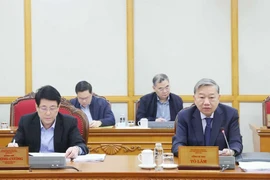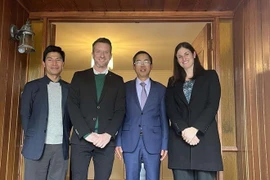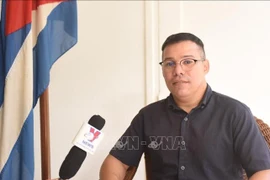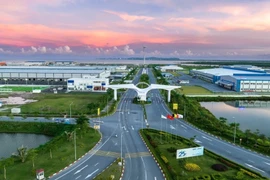Sydney (VNA) - Emeritus Professor Carl Thayer, from the Australian Defence Force Academy at the University of New South Wales, praised the Communist Party of Vietnam (CPV)'s leadership in the country's renewal, especially the role of late General Secretary Nguyen Phu Trong.
In a recent interview granted to the Vietnam News Agency (VNA)'s correspondents in Sydney on the occasion of the CPV's 95th founding anniversary (February 3, 1930-2-25), Thayer recognised the late Party chief for his successful leadership of the CPV, overseeing sustained economic growth averaging 5.5% from 2011 to 2023, except during the COVID-19 pandemic. He also highlighted Trong’s leadership in tackling corruption and other negative phenomena, promoting Party building, addressing the pandemic, and earning global recognition for the CPV’s role in foreign affairs.
General Secretary Trong’s anti-corruption campaign made measurable progress raising Vietnam’s score on Transparency International’s Perceptions of Corruption Index from 2.9 in 2011 to 41 in 2023. The Perception of Corruption Index ranks over 180 countries on a scale from 0 (highly corrupt) to 100 very clean. Vietnam rose from 112th to 83rd from 2011 to 2023.
According to the Australian scholar, the campaign against corruption is a necessary but not sufficient requirement to achieve Vietnam’s development goals.
Vietnam needs to continue the corruption combat but something else must be done. Vietnam must streamline the state apparatus in order facilitate the modernisation of its means of production to take advantage of the Fourth Industrial Revolution such as technological innovation, digitisation, artificial intelligence, and quantum computing, said Thayer.
The CPV has identified that Vietnam is on the brink of entering a new era of growth. Regarding the goals that Vietnam has set for 2030 and 2045, he said the objectives are necessary to prevent Vietnam from falling into the middle-income traps, adding the factors that led to Vietnam’s current growth such as labour-intensive manufacturing is no longer sufficient to boost income and productivity to higher.
According to Thayer, the ongoing campaign to streamline the state apparatus provides Vietnam with the opportunity to develop the capacity needed to transition to technology-intensive production. This shift could foster a growing middle class and boost domestic consumption.
Vietnam has the potential to become a reliable player in the global supply chain for high-tech products like computer chips, solar panels, and electric vehicles, Thayer suggested. He recommended leveraging the country’s expanding network of strategic partnerships to achieve this.
Citing the myriad challenges Vietnam faces such as overcoming bureaucratic resistance to change, reforming its bureaucratic structures, and finding foreign investment to upgrade human resources for the new technological era, Thayer recommended developing a highly skilled technology-savvy workforce; developing well-integrated domestic value chains; proactively deepen regional trade integration; shifting from labour-intensive production to technology-intensive high-value production; and reducing carbon-intensive manufacturing to low-carbon production./.
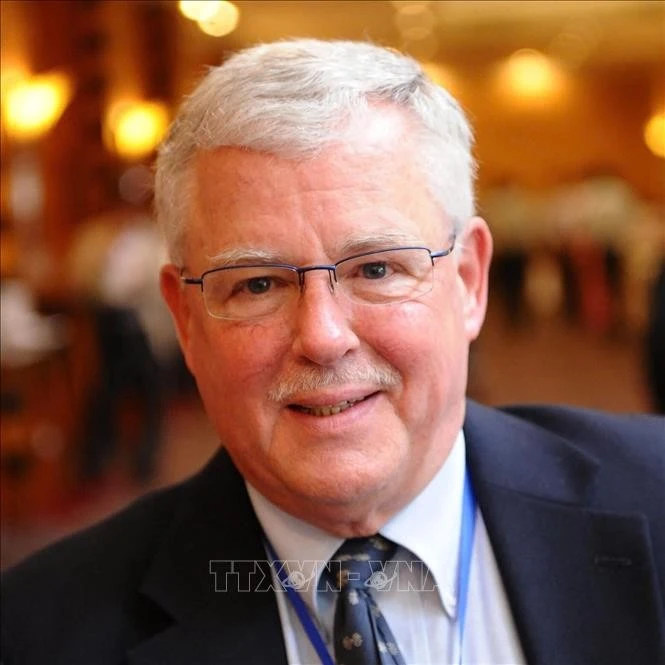
See more
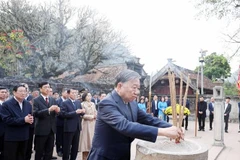
Party chief pays tribute to ancestors at Hoa Lu ancient capital
Party General Secretary To Lam paid tribute to King Dinh Tien Hoang and King Le Dai Hanh, affirming his determination, together with the entire Party, the army and the people, to continue promoting the revolutionary spirit and the patriotic tradition of the nation.
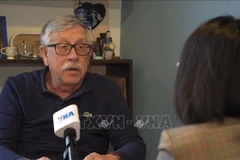
Vietnam strengthens its global standing: Russian experts
Many leading Russian experts have highlighted Vietnam’s increasing position in the international arena and its evolving relationship with Russia.
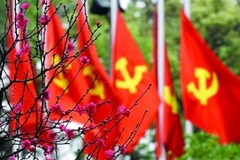
Indonesian researcher highlights Party’s role in Vietnam’s development
Veeramalla Anjaiah, a senior researcher at the Indonesia-based Centre for Southeast Asian Studies, has lauded the Communist Party of Vietnam (CPV)'s pivotal role in the country’s development.
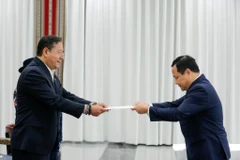
Bolivia treasures friendship, cooperation with Vietnam: President
Bolivian President Luis Alberto Arce has affirmed that the South American country has attached much importance to the friendship and collaboration with Vietnam.
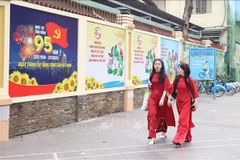
Communist Party of Vietnam helps shape global cultural legacy: Cuban media chief
The Communist Party of Vietnam (CPV) has not only ushered in a new era but also fostered a cultural landscape in Vietnam’s development, while contributing to humanity’s shared cultural heritage.
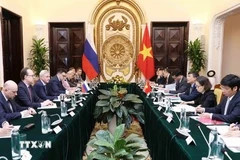
Vietnam – Russia relations on upward trajectory: former ambassador
The diplomatic relation between Vietnam and Russia has consistently developed in an upward trajectory, growing more intensively and extensively.
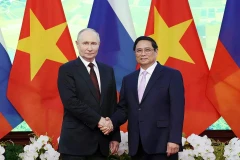
Traditional friendship shapes future Vietnam – Russia cooperation: Ambassador
Vietnamese Ambassador to Russia Dang Minh Khoi has said the Vietnam – Russia relationship, set up on January 30, 1950, have evolved from the historical roots to today’s comprehensive strategic partnership.
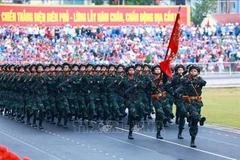
Argentine Party official praises CPV’s glorious journey
Marcelo Rodriguez, head of the Commission for Foreign Affairs of the Central Committee of the Communist Party of Argentina (CPA), has praised the Communist Party of Vietnam (CPV)'s glorious journey in a recent interview with the Vietnam News Agency.
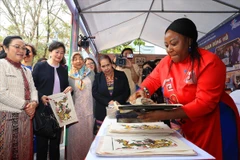
People-to-people diplomacy ready to join nation in new era: VUFO President
People-to-people diplomacy should move beyond old mindsets to reach regional and international levels.
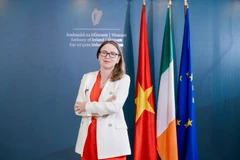
Ireland-Vietnam ties reach historic milestone with first-ever state visit: Ambassador
In an interview with the Vietnam News Agency, Irish Ambassador Deirdre Ní Fhallúin highlighted the transformative year in bilateral relations, marked by Party General Secretary To Lam's groundbreaking visit to Dublin and the announcement of Vietnam's first resident embassy in Ireland.
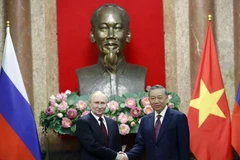
Vietnamese, Russian leaders exchange congratulations on diplomatic ties anniversary
Vietnamese and Russian leaders emphasised that the bilateral friendship has withstood the test of history over the past 75 years, affirming its strong vitality and continuous development.
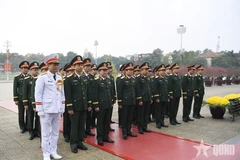
Military delegation pays tribute to President Ho Chi Minh on Tet occasion
The Party, military, and people of Vietnam remain steadfast on the path President Ho Chi Minh chose, and creatively apply his thoughts to bring the revolutionary cause he left to new heights, thus helping the country stand shoulder to shoulder with the great powers of the world.
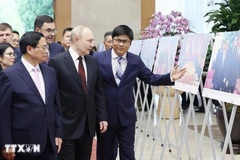
Friendship, mutual understanding, assistance – foundations of Russia-Vietnam ties: expert
Russia views Vietnam as one of its most trusted and friendly partners, and this has been a consistent stance in its foreign policy.
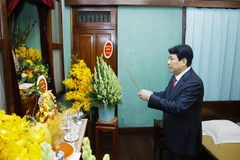
State President pays respect to late leader at lunar year’s beginning
State President Luong Cuong expressed his profound gratitude to the immense contributions of President Ho Chi Minh - the beloved leader of the Vietnamese nation.

Party's role significant in Vietnam's history: Front member in Australia
Despite numerous challenges, the Communist Party of Vietnam has consistently driven sustainable development, secured leadership in national reforms, and raised Vietnam’s global profile.
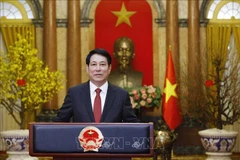
State President Luong Cuong extends Lunar New Year greetings
"In this sacred moment of transition to the new year, on behalf of the Party and State leaders, I would like to extend my warmest new year wishes to all compatriots, comrades and soldiers across the country, and overseas Vietnamese."
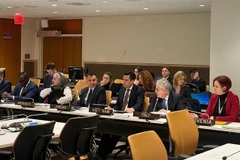
Vietnam appointed co-coordinator for UN pandemic response summit
This marks the first time Vietnam has been appointed as a co-facilitator for preparing a major UN conference, highlighting the UNGA President’s and the international community’s acknowledgment of Vietnam’s reputation, role, and valuable contributions to global efforts, especially in pandemic prevention and control.
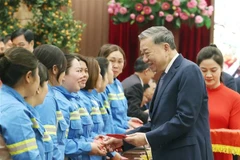
Party chief extends Tet greetings to Hanoi authorities, residents
In the vibrant Tet atmosphere of the capital, Party General Secretary To Lam extended his warmest Lunar New Year wishes to the city’s officials, soldiers, and residents on behalf of the Party and State.
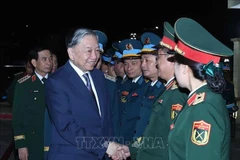
Party chief inspects combat readiness at public security, military units
Party General Secretary To Lam inspected the on-duty situation and combat readiness at the National Cyber Security Centre under the Ministry of Public Security’s Department of Cyber Security and High-Tech Crime Prevention, and the Command Centre of the Ministry of National Defence’s Air Defense - Air Force Service in the evening of January 28 – the last day of the lunar year.
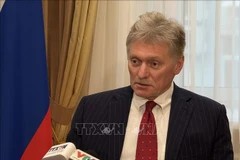
Kremlin spokesperson highlights growing Vietnam-Russia ties
Dialogue between Vietnam and Russia is continuously evolving at various levels, from working meetings to high-level and top-tier discussions, Kremlin spokesperson Dmitry Peskov.
